Episode 90
 |
| Ozzie's back to direct another episode! |
It's the beginning of the shift and Mac is taking roll.
Malloy and Reed are present and he assigns them to Adam-12. Why mess with a good thing?
The next name he calls is that of a new man on board today, Art McCall. Art comes busting through the door after Mac calls his name for the second time. He explains that he's late because he couldn't figure out how to put on the "new-fangled" Bruce Browne belt.
Reed and Malloy chuckle at Art's wardrobe malfunction.
 |
| [Ha, ha...old people.] |
As the officers file out of the assembly room several of them stop and shake McCall's hand. Reed wonders what all the hubbub is over the new guy. He asks Malloy, "Who's he?".
 |
| "Art McCall, one of the best policemen that ever walked the beat. He's a legend." [Malloy, can I trust your judgement? You said the same thing about Tony Johnson, and we know how that turned out.] |
So, if this Art guy is such a legend, why has Reed never heard of him?
 |
| "He died eight years ago saving Ben Powers' life." [He came back as Stacy Keach. But, since there is already a Stacy Keach, he decided to rejoin the force.] |
After roll call Pete and Jim stop at the report desk. Jim asks for more details on what Pete said in the assembly room. He thinks his partner is pulling his leg about Art dying eight years ago. Pete assures him it's no joke, Art saved Ben Powers' life and died in the process.
 |
| "He was dead for three minutes." |
Doctors were able to bring McCall back from the great beyond with open heart massage. A year after the incident the department retired him with a disability pension. Malloy has first-hand knowledge of what happened because he and Powers were probationers together. They were "fresh out of the academy, green as shamrocks, and didn't want it to show."
The very green Powers tried to capture what he thought was a plain drunk all by himself. The drunk turned out to be an escapee who put a gun in Powers' stomach. He walked the neophyte office to an out-of-the-way parking lot and was just about to pull the trigger when McCall distracted him. McCall caught three .38 slugs because of Powers' mistake, but he never let the rookie take any heat for it. McCall's treatment of Powers earned him Malloy's respect.
 |
| "I never forgot that. He was a cop I looked up to." |
Malloy is happy and not too surprised to see his old friend back on the job. When McCall was retired he vowed that he would return. His love for the job made him keep hammering at the pension board for eight years. His hard work finally paid off when his doctor's recently gave the green light for McCall to return to work.
Art, lugging all of his shiny, new gear, joins Pete and Jim in the station parking lot just as Pete finishes his backstory. Art can't believe all the stuff they have to tote around nowadays. Pete offers to find him a briefcase, Art thinks he'll need a steamer trunk instead.
Once Art is loaded up and ready to go Mac comes out and tells Pete that the "new" guy will be riding in Adam-12 as a third man for a deployment period. Art doesn't think it will take that long to relearn the job, all Pete has to do is explain the new equipment and he'll be ready to roll on his own. Art's sure that street policing couldn't have changed that much in eight years.
Art will soon have a chance to test that theory. The RTO's voice comes out of the car radio asking for any unit in the vicinity to identify and handle a call of man assaulting a woman at 207 Redman Street. Reed grabs the mic and lets her know that 1-Adam-12 will handle the call. Reed, Malloy, McCall pile into the patrol unit.
At 207 Redman, Shirley Young meets the officers in front of her house. This is her first call to the police since she left Oregon two years ago, but she doesn't think it will be her last. As she runs down her vital statistics for the officers it seems that she has been through this drill many times. She knows which questions the Oregon police always asked and has her same answers ready for the Los Angeles Police before they ask anything.
She also has a description, address, and photo of her ex-husband. She wants him picked up, locked up, and put away. She finishes her speech by breaking down and telling them that she just wants him to leave her alone.
Art is perplexed by Ms. Young's display of emotion.
Pete lets her know that they may be able to help, but first they'll have to know what happened.
Shirley starts at the beginning of the story. She married Frank Young six years and found out what that he was mean, disturbed, and insanely jealous man. Love, patience, understanding, doctors, medicine, and institutions were no help; nothing could change him. She divorced him, but she could not rid herself of Frank Young. He remained fixated on her and tried to kill her by running her car off a canyon road. Young was arrested and sentenced to two years in an Oregon prison. While he served his time, Shirley moved to Los Angeles. Young was released from prison last week and has now found his way to Shirley's front door in L.A.
Now that Young has learned where Shirley lives, she's afraid of what will happen next. He didn't hit her today, but she knows he's capable of that and much more. She didn't see it, but she's sure he had a gun under his coat. He kept touching his coat and telling her that if he couldn't have her, no one could.
And that was all Frank really did. He didn't hit Shirley or show her the gun, he only talked. He only said things that will drive her crazy with worry about the next time she sees Frank. Then he may do more than talk. She begs the officers for help, and receives differing responses.
Art assures her they will help. Pete jumps in and tells Shirley they will help by assigning an extra patrol in front of her house, there's little they can do since an actual crime hasn't been committed. Shirley's not encouraged, this is the same answer her pleas were met with in Oregon.
When the newly formed threesome is back in the patrol unit, the newest member expresses his displeasure with the current boundaries of their job. McCall's angry that they could only give Shirley Young an extra patrol and advise her to consult an attorney about getting a restraining order. He wants to have a chat with her ex-husband. They have his address, what's stopping them?
Reed doesn't see the point in seeking him out.
McCall figures they'll go over there and find a gun, there's a good chance he has one. Since he is an ex-con, a gun in his possession will send him back to jail. Malloy cautions the veteran rookie that searching Young's home without probable cause may get them sent to the slammer. He explains that search and seizure laws have changed since he last wore the badge.
While McCall gets over his frustration at yet another change to the job he loves, the RTO breaks in with a 459 silent call at the warehouse at 417 Commerce Street. Reed comments that this call may be their break, Malloy certainly hopes it is. McCall has no idea what they're talking about and asks to be filled in. Reed leans back and tells his second partner that a gang of juvenile burglars has been hitting the warehouse district hard. This call may be their chance to catch the gang. The prospect of nabbing some bad guys excites McCall, now they can finally get down to some "righteous police work".
Adam-12 arrives at the warehouse and finds a teenaged boy behind the wheel of an old, gray jalopy parked in the alley. Malloy pulls the black and white in front of the teen's car, preventing him from making a motorized exit. All at once the doors of the police car and the driver's door of the gray car open at the same time. The boy runs for the fence at the opposite end of the alley, McCall close on his heels. While McCall is occupied chasing after the driver, Malloy and Reed enter the warehouse.
They slink around stacks of boxes then happen upon two more teenaged boys prying open a crate with a crowbar. Malloy tells them to stop.
But his words fall on deaf ears.
Reed turns around and heads in the other direction, after the boy in the denim on denim combo.
After a short pursuit Malloy corners the boy with the crowbar. He raises the weapon and stares down the officer, but Malloy doesn't even flinch.
Meanwhile Reed weaves his way through a maze of boxes looking high and low for the other juvenile.
Only he doesn't look quite high enough.
The delinquent pushes the box from the top of the stack nearly hitting Reed.
He also gives up his hiding spot with his overhead attack. Reed leaps up and pulls the youth down to the ground by his shirt.
As Reed cuffs his suspect, Malloy convinces his to give up the weapon he's holding.
Both Malloy and Reed then read the suspects their rights.
Malloy and Reed come outside with their captures and find that McCall has caught the driver of the gray car. As he shows the suspect to the backseat of the Satellite, McCall informs his partners that the boy's name is Corky Nelson and he's been planning all of the warehouse burglaries.
After the three young suspects are seated in what will soon be a very crowded patrol car, Officer McCall does a bit of boasting. Thanks to his skillful interrogation techniques, Corky has also confessed to nine other burglaries.
Reed is impressed and asks McCall for some pointers on getting juvenile suspects to talk.
McCall tells the younger officer the technique he's developed from years of experience. An officious smile, some child psychology, then pop the questions and they can't help but talk. That's all old news to Reed, he wants to know how McCall gets them to keep talking once he reads them their rights.
And that's when their good bust times three falls apart.
McCall didn't read Corky Nelson his rights, that would have interrupted the flow of their conversation.
McCall had Nelson talking, why would he blow it with all that "legal hogwash"?
Malloy sighs and heads back to the car while fishing his policeman's notebook out of his shirt pocket. Once there he opens the back door and begins reading the words printed on the back of the notebook.
A week passes and Reed grows increasingly frustrated with McCall. He finds Malloy at the report desk and decides it's finally time to say something. He takes a deep breath and tells his partner that he may need to take a different approach to McCall's training.
Malloy thinks Reed just needs to be more patient, McCall has a lot of things to learn. Reed argues that what McCall needs isn't more technical training, it's an attitude adjustment. The old-timer just isn't buying into the way things are done now.
Malloy knows Reed is right and concurs with everything his partner says. He agrees to talk with McCall, but requests a favor from Reed in return.
Malloy asks him to ease up on McCall. He was a top policeman once and Malloy has faith that he can learn the new ways and become one again. Reed consents to giving McCall another chance and comments on the incredible amount of tolerance Malloy has.
When they're back on patrol McCall admits to his partners that the job is different now from when he last walked a beat. It's been hard for him to adjust, but from now on he's going to "follow the leader and do things the right way" even if he doesn't agree that it's the best way. Malloy is glad to hear his change in attitude.
McCall is ready to start learning and doesn't want to wait for a call. He suggests they check on Shirley Young. Malloy thinks this is a fine idea and steers the car in that direction. They head down a residential street where they're cut off by a black Mustang pulling away from the curb. It's the best reason for a writing a ticket that McCall has seen since he's been back. That may be, but Malloy explains that the driver will only get a warning if everything checks out.
After they pull the Mustang over, Malloy goes to talk to the driver. McCall hangs back with Reed and asks him about the policy that won't allow them to write the guy a ticket. Reed tells him that they would have written a ticket if the driver had interfered with anyone else's right of way. But, since it was their's, he'll only get a warning. It makes sense to Reed, in court it could be perceived as a personal issue. McCall doesn't agree, but he'll go along with the policy. Reed praises McCall for learning then goes to check on Malloy.
McCall, however, is distracted by a passing figure in a cream-colored corduroy coat. He comes up behind the man and tells him to put his hands behind his head. The man does as he's told then McCall frisks and cuffs him without saying another word.
Malloy and Reed have finished talking with the driver of the Mustang and wonder what the heck McCall has been doing in the few minutes they've been gone. McCall proudly shows off his latest "catch". It's Frank Young, two blocks from his ex-wife's house with a gun in his waistband. McCall's taking him in for the felony of being an ex-con in possession of a firearm.
Art's quite pleased with himself, now Shirley Young won't have to worry about her ex anymore. Pete's not so sure about that. He asks Art if he bothered to talk to Frank before searching him. Art didn't see that there was any need for that, he matched the description perfectly and he figured it was more important to see if he had a gun. Jim's disappointed by Art's answer to say the least.
When they return to the station with their latest arrest Mac is not impressed at all. Art's confused, he doesn't understand why everyone is so upset with him. After all, Frank is guilty. Why don't they just lock him up and be done with it? Mac lays out for Art the crucial element missing in his theory.
Three dejected officers leave Mac's office after the sergeant tells them he has to let Frank Young go.
Malloy, Reed, and McCall show up at Shirley Young's doorstep just as she is leaving the house to run an errand. She's heard what happened with Frank and isn't happy. Malloy doesn't blame her for being upset and does his best to apologize for not holding onto Frank.
Shirley decides to accept his apology and asks if they'll still keep an eye on her house. She hasn't seen or heard from Frank, but she still worries about what he might do. McCall senses the strain the poor woman is under due to his mistake and offers a personal apology. She thanks him then excuses herself to go to the store.
The three officers linger on the sidewalk for a minute after she leaves. They're just about ready to get back in the car when they hear a loud "boom" come from the direction of Shirley's house. They turn and see that Shirley's car has exploded then take off running towards the destruction.
Reed pulls her from the wreckage then heads to the radio to call for an ambulance, detectives, and bomb squad. Malloy and McCall stay with the unconscious Shirley.
After Shirley has been taken to the hospital they meet up with Mac. He lets them know that Shirley is still on the critical list but seems to be improving. He also tells them that Adam-14 found a neighbor who saw a man dressed as a gas station attendant working under the hood of Shirley's car.
They showed the neighbor some pictures and he picked out Frank Young. Now that they have a positive ID, they can take him. Mac instructs them to leave their car and go on foot to Frank's house. Malloy and Reed will go in the front and McCall will take the back.
McCall doesn't like his assignment, he wants to go in with Malloy and Reed. He feels he owes it to Shirley. Mac firmly reiterates to McCall that he'll take the back. It's a police operation, nothing more, nothing less.
Art shouldn't have been so upset, though. He's the one who ends up catching Frank.
McCall catches Young as he tries to escape through the back yard. He drags the creep through back to the house and is just about to have a "conversation" with Young (using his fist) when Malloy shows up.
Later, at the report desk, Pete catches up with Art and asks him how it's going. Art admits that he wanted to beat Frank Young to a pulp. Pete tells him that the important thing is he didn't act on his impulse, but this offers little consolation to Art. He's still mad about what happened to Shirley Young. Maybe he'd feel differently if Mac hadn't let Frank go the first time. Malloy stops his friend and reminds him that Mac isn't to blame.
Pete doesn't mince words with Art, if he had followed legal procedures Frank Young would probably be in jail and Shirley wouldn't be in the hospital. Art admits he didn't realize how different things would be when he came back
Pete knows what he has to say next will be difficult for Art to hear. He stutters slightly as he tries to get the words out.
He points out to Art that he just wasn't around to experience and grow with the changes as they happened. Art argues that he can change, he knows he can. Pete doesn't think they have the time to wait for that.
He begs Art to step aside now to hold onto his dignity and the reputation he had eight years ago.
Art asks Pete how he can quit the job he fought so hard to get back. Pete thinks he has a way for his friend to walk away with his head held high.
Art confesses that he's never been more miserable in his life.
Maybe I've gained a lot of maturity in the two years since I first saw this episode, but this time around I really felt for McCall in a way that I hadn't before. I could really sympathize with poor, old Art. He used to be at the top of his game and now, through no fault of his own, he's reduced to being, essentially, a rookie again. One that doesn't even have the advantage of recent academy training, either. The job may look the same on the outside (the cars are still black and white, the uniforms are still midnight blue), but a lot of what goes into it has changed. You can't just slap the cuffs on someone without reading them their rights, you can't punch a suspect without repercussions are just some of the things he has to learn.
On top of all that, McCall also has to deal with Reed. He's cast in a different light here, his bickering and shortness with McCall make Reed out to be a little bit of a jerk. I enjoyed seeing McCord bringing this dimension of the the character to life. His performance almost made me like Reed a little bit less (almost). I'm sure there were times when McCall wanted to beat that handsome, young know-it-all Reed in the same way he wanted to beat Frank Young.
At least Art has a friend in Pete, the peacekeeper between the two of them. Pete truly is caught in the middle here, he knows what a top-notch cop Art used to be and sees how is missing the mark in the modern-day LAPD. Pete is tasked with convincing the young Reed that Art is great cop while also telling that great cop that he's not doing so great. You can tell it wears on Malloy, especially in the final scene. The spring seems to have gone out of his step as he approaches the desk and you can see him struggle with telling Art that he's not cut out for the job anymore. Milner's hesitation with those words makes the line even more heartbreaking. You know it hurts Malloy to say them as much as it hurts McCall to hear them.
This is where I would usually tell you what I didn't like about the episode. But there's nothing here that I didn't like, so I'll just skip ahead to my rating, which is:
Do you agree? Let me know somewhere, out there in cyberspace. See you next time with "Pick-up"!
Art, lugging all of his shiny, new gear, joins Pete and Jim in the station parking lot just as Pete finishes his backstory. Art can't believe all the stuff they have to tote around nowadays. Pete offers to find him a briefcase, Art thinks he'll need a steamer trunk instead.
Once Art is loaded up and ready to go Mac comes out and tells Pete that the "new" guy will be riding in Adam-12 as a third man for a deployment period. Art doesn't think it will take that long to relearn the job, all Pete has to do is explain the new equipment and he'll be ready to roll on his own. Art's sure that street policing couldn't have changed that much in eight years.
Art will soon have a chance to test that theory. The RTO's voice comes out of the car radio asking for any unit in the vicinity to identify and handle a call of man assaulting a woman at 207 Redman Street. Reed grabs the mic and lets her know that 1-Adam-12 will handle the call. Reed, Malloy, McCall pile into the patrol unit.
At 207 Redman, Shirley Young meets the officers in front of her house. This is her first call to the police since she left Oregon two years ago, but she doesn't think it will be her last. As she runs down her vital statistics for the officers it seems that she has been through this drill many times. She knows which questions the Oregon police always asked and has her same answers ready for the Los Angeles Police before they ask anything.
She also has a description, address, and photo of her ex-husband. She wants him picked up, locked up, and put away. She finishes her speech by breaking down and telling them that she just wants him to leave her alone.
Art is perplexed by Ms. Young's display of emotion.
Pete lets her know that they may be able to help, but first they'll have to know what happened.
Shirley starts at the beginning of the story. She married Frank Young six years and found out what that he was mean, disturbed, and insanely jealous man. Love, patience, understanding, doctors, medicine, and institutions were no help; nothing could change him. She divorced him, but she could not rid herself of Frank Young. He remained fixated on her and tried to kill her by running her car off a canyon road. Young was arrested and sentenced to two years in an Oregon prison. While he served his time, Shirley moved to Los Angeles. Young was released from prison last week and has now found his way to Shirley's front door in L.A.
Now that Young has learned where Shirley lives, she's afraid of what will happen next. He didn't hit her today, but she knows he's capable of that and much more. She didn't see it, but she's sure he had a gun under his coat. He kept touching his coat and telling her that if he couldn't have her, no one could.
And that was all Frank really did. He didn't hit Shirley or show her the gun, he only talked. He only said things that will drive her crazy with worry about the next time she sees Frank. Then he may do more than talk. She begs the officers for help, and receives differing responses.
Art assures her they will help. Pete jumps in and tells Shirley they will help by assigning an extra patrol in front of her house, there's little they can do since an actual crime hasn't been committed. Shirley's not encouraged, this is the same answer her pleas were met with in Oregon.
 |
| "It's the only answer we can give, ma'am. We can't pick him up, we don't have any legal grounds to arrest him." |
Reed doesn't see the point in seeking him out.
 |
| "What are we gonna chat about, the weather?" |
While McCall gets over his frustration at yet another change to the job he loves, the RTO breaks in with a 459 silent call at the warehouse at 417 Commerce Street. Reed comments that this call may be their break, Malloy certainly hopes it is. McCall has no idea what they're talking about and asks to be filled in. Reed leans back and tells his second partner that a gang of juvenile burglars has been hitting the warehouse district hard. This call may be their chance to catch the gang. The prospect of nabbing some bad guys excites McCall, now they can finally get down to some "righteous police work".
Adam-12 arrives at the warehouse and finds a teenaged boy behind the wheel of an old, gray jalopy parked in the alley. Malloy pulls the black and white in front of the teen's car, preventing him from making a motorized exit. All at once the doors of the police car and the driver's door of the gray car open at the same time. The boy runs for the fence at the opposite end of the alley, McCall close on his heels. While McCall is occupied chasing after the driver, Malloy and Reed enter the warehouse.
They slink around stacks of boxes then happen upon two more teenaged boys prying open a crate with a crowbar. Malloy tells them to stop.
 |
| "Okay, boys, hold it right there!" |
 |
| One of them chucks a box at the officers and the chase is on. |
 |
| Malloy leaps over the crate and takes off after the boy with the crowbar. |
After a short pursuit Malloy corners the boy with the crowbar. He raises the weapon and stares down the officer, but Malloy doesn't even flinch.
 |
| "Let's have it." |
Only he doesn't look quite high enough.
The delinquent pushes the box from the top of the stack nearly hitting Reed.
He also gives up his hiding spot with his overhead attack. Reed leaps up and pulls the youth down to the ground by his shirt.
As Reed cuffs his suspect, Malloy convinces his to give up the weapon he's holding.
 |
| "C'mon, son, give it up. Don't get yourself in any deeper." |
 |
| [Here you go, officer.] |
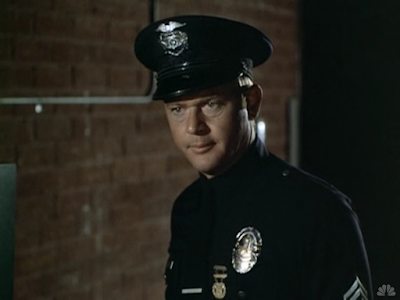 |
| "Okay, now I'm gonna tell you about your rights." |
Malloy and Reed come outside with their captures and find that McCall has caught the driver of the gray car. As he shows the suspect to the backseat of the Satellite, McCall informs his partners that the boy's name is Corky Nelson and he's been planning all of the warehouse burglaries.
After the three young suspects are seated in what will soon be a very crowded patrol car, Officer McCall does a bit of boasting. Thanks to his skillful interrogation techniques, Corky has also confessed to nine other burglaries.
 |
| "Officer McCall, you're right back in the swing." |
McCall tells the younger officer the technique he's developed from years of experience. An officious smile, some child psychology, then pop the questions and they can't help but talk. That's all old news to Reed, he wants to know how McCall gets them to keep talking once he reads them their rights.
And that's when their good bust times three falls apart.
McCall didn't read Corky Nelson his rights, that would have interrupted the flow of their conversation.
 |
| "That's like breaking for a commercial in the middle of a love scene." |
McCall had Nelson talking, why would he blow it with all that "legal hogwash"?
 |
| "Because the law says so." |
 |
| "You have the right to remain silent..." |
 |
| "Pete, I think it's more than just bringing him along slow. I think you have to come on strong with him. He's fouled up almost every day for the past week." |
Malloy asks him to ease up on McCall. He was a top policeman once and Malloy has faith that he can learn the new ways and become one again. Reed consents to giving McCall another chance and comments on the incredible amount of tolerance Malloy has.
 |
| "Glad to hear you say that, partner, after all the trouble I went to breaking you in." |
When they're back on patrol McCall admits to his partners that the job is different now from when he last walked a beat. It's been hard for him to adjust, but from now on he's going to "follow the leader and do things the right way" even if he doesn't agree that it's the best way. Malloy is glad to hear his change in attitude.
 |
| "That's a start." |
After they pull the Mustang over, Malloy goes to talk to the driver. McCall hangs back with Reed and asks him about the policy that won't allow them to write the guy a ticket. Reed tells him that they would have written a ticket if the driver had interfered with anyone else's right of way. But, since it was their's, he'll only get a warning. It makes sense to Reed, in court it could be perceived as a personal issue. McCall doesn't agree, but he'll go along with the policy. Reed praises McCall for learning then goes to check on Malloy.
McCall, however, is distracted by a passing figure in a cream-colored corduroy coat. He comes up behind the man and tells him to put his hands behind his head. The man does as he's told then McCall frisks and cuffs him without saying another word.
Malloy and Reed have finished talking with the driver of the Mustang and wonder what the heck McCall has been doing in the few minutes they've been gone. McCall proudly shows off his latest "catch". It's Frank Young, two blocks from his ex-wife's house with a gun in his waistband. McCall's taking him in for the felony of being an ex-con in possession of a firearm.
Art's quite pleased with himself, now Shirley Young won't have to worry about her ex anymore. Pete's not so sure about that. He asks Art if he bothered to talk to Frank before searching him. Art didn't see that there was any need for that, he matched the description perfectly and he figured it was more important to see if he had a gun. Jim's disappointed by Art's answer to say the least.
 |
| "Five to one you just blew another one for us." |
 |
| "He's also entitled to the protection of the law and since we're supposed to enforce it, I think we should uphold it as well." |
Malloy, Reed, and McCall show up at Shirley Young's doorstep just as she is leaving the house to run an errand. She's heard what happened with Frank and isn't happy. Malloy doesn't blame her for being upset and does his best to apologize for not holding onto Frank.
 |
| "Sorry doesn't help much, does it?" |
 |
| "No, it doesn't, but that's all we can say." |
The three officers linger on the sidewalk for a minute after she leaves. They're just about ready to get back in the car when they hear a loud "boom" come from the direction of Shirley's house. They turn and see that Shirley's car has exploded then take off running towards the destruction.
Reed pulls her from the wreckage then heads to the radio to call for an ambulance, detectives, and bomb squad. Malloy and McCall stay with the unconscious Shirley.
After Shirley has been taken to the hospital they meet up with Mac. He lets them know that Shirley is still on the critical list but seems to be improving. He also tells them that Adam-14 found a neighbor who saw a man dressed as a gas station attendant working under the hood of Shirley's car.
 |
| [Why didn't they call us immediately? Do gas stations make house calls in this neighborhood?] |
McCall doesn't like his assignment, he wants to go in with Malloy and Reed. He feels he owes it to Shirley. Mac firmly reiterates to McCall that he'll take the back. It's a police operation, nothing more, nothing less.
 |
| [Now that you're here, Art, I finally get to go in the front.] |
 |
| After Malloy and Reed knock on his door and... |
 |
| he dives out of a window. |
 |
| "Put the cuffs on him, Art. It's all over." |
Malloy doesn't like what he almost witnessed.
Later, at the report desk, Pete catches up with Art and asks him how it's going. Art admits that he wanted to beat Frank Young to a pulp. Pete tells him that the important thing is he didn't act on his impulse, but this offers little consolation to Art. He's still mad about what happened to Shirley Young. Maybe he'd feel differently if Mac hadn't let Frank go the first time. Malloy stops his friend and reminds him that Mac isn't to blame.
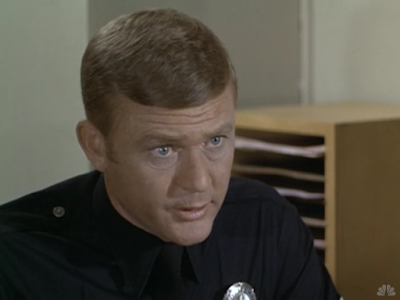 |
| "You blew that one. You have to accept the responsibility." |
Pete knows what he has to say next will be difficult for Art to hear. He stutters slightly as he tries to get the words out.
 |
| "Maybe you're just not cut out for the job anymore, Art." |
 |
| "What happens in the meantime? A few more burglaries we could have prevented? Another injured girl?" |
 |
| "Art, you were a great cop. That's the way I'd like to remember you." |
 |
| "Have you been happy since you came back on?" |
 |
| "You answered your own question." |
The End
I really like this one, which is kind of a surprise to me since I didn't give it much thought the first time I watched it. I dismissed it as an All in the Family/ Adam-12 hybrid where "Archie" McCall rejoins the force, "Meathead" Reed tries to show him that the new ways are better, and "Dingbat" Malloy is the voice of reason. Now that I've watched it again, I can see that it's a little bit like that. But the added dramatic tension of life or death police situations and the workplace dynamic make it so much better than I originally thought.Maybe I've gained a lot of maturity in the two years since I first saw this episode, but this time around I really felt for McCall in a way that I hadn't before. I could really sympathize with poor, old Art. He used to be at the top of his game and now, through no fault of his own, he's reduced to being, essentially, a rookie again. One that doesn't even have the advantage of recent academy training, either. The job may look the same on the outside (the cars are still black and white, the uniforms are still midnight blue), but a lot of what goes into it has changed. You can't just slap the cuffs on someone without reading them their rights, you can't punch a suspect without repercussions are just some of the things he has to learn.
On top of all that, McCall also has to deal with Reed. He's cast in a different light here, his bickering and shortness with McCall make Reed out to be a little bit of a jerk. I enjoyed seeing McCord bringing this dimension of the the character to life. His performance almost made me like Reed a little bit less (almost). I'm sure there were times when McCall wanted to beat that handsome, young know-it-all Reed in the same way he wanted to beat Frank Young.
At least Art has a friend in Pete, the peacekeeper between the two of them. Pete truly is caught in the middle here, he knows what a top-notch cop Art used to be and sees how is missing the mark in the modern-day LAPD. Pete is tasked with convincing the young Reed that Art is great cop while also telling that great cop that he's not doing so great. You can tell it wears on Malloy, especially in the final scene. The spring seems to have gone out of his step as he approaches the desk and you can see him struggle with telling Art that he's not cut out for the job anymore. Milner's hesitation with those words makes the line even more heartbreaking. You know it hurts Malloy to say them as much as it hurts McCall to hear them.
This is where I would usually tell you what I didn't like about the episode. But there's nothing here that I didn't like, so I'll just skip ahead to my rating, which is:
Do you agree? Let me know somewhere, out there in cyberspace. See you next time with "Pick-up"!
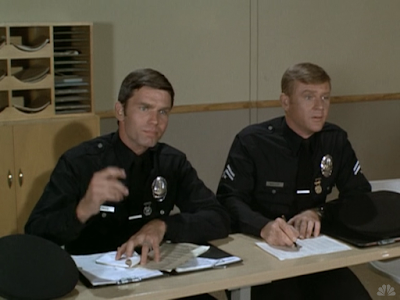






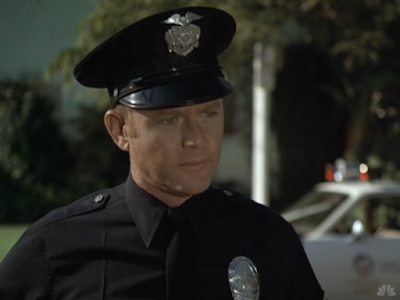












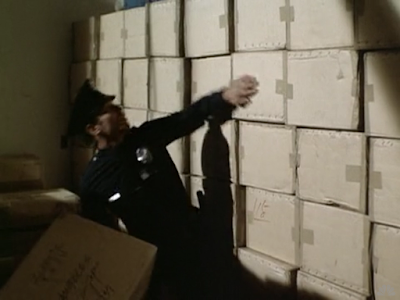







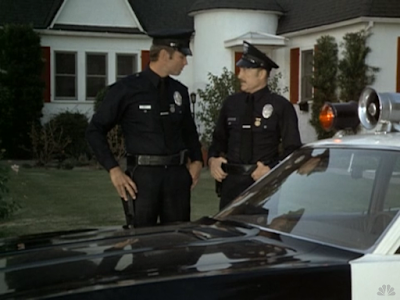




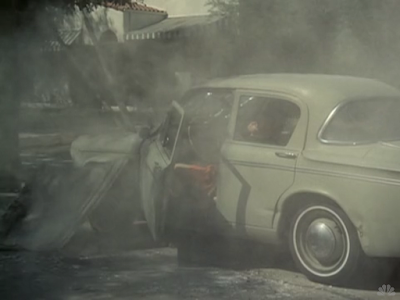

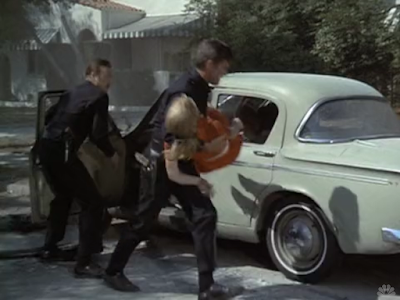







One of the greatest episodes. Warren Stevens was one of those unassuming, solid talents who always delivered. You could count on him to give good value in any roll he played. He certainly delivered here.
ReplyDeleteOne of the greatest episodes. Warren Stevens was one of those unassuming, solid talents who always delivered. You could count on him to give good value in any roll he played. He certainly delivered here.
ReplyDeleteI actually like Reed's attitude in this episode. Seems to me that he's just sticking to his usual position that suspects deserve fair treatment per the law (innocent til proven guilty) rather than old-school "fist justice" meted out by a righteous LEO in defense of a victim. I understand the older returning cop's vengeful anger at the nasty ex-husband, but one reason for laws is to avoid vigilante retribution. Both Reed's and McCall's feelings are totally understandable, and I sympathize with both of them, but if you're a "good cop", you can't just enforce the laws you like or apply them when you choose. I just think Reed will always be a good, fair cop. His disillusionment doesn't develop until much later in the series, bless his heart, and I guess I'll just always love his character.
ReplyDeleteI agree with Reed's attitude and message, McCall has to change. But, I think he is just a little harsh with McCall. Malloy seems to treat him much more gently. But, as Reed points out, that doesn't work either.
DeleteOmg you got this one all wrong! Lol
ReplyDeleteA top rating? You are a mad woman! I liked Reefs annoyance because it makes sense that he would not relate to the old guy's ways, the scene with Malloy reallyis good. Malloy can be crabby, but with sympathy and Grace got the guy to realize he wanted to leave. Ah, Milner. I never like actors that are kind of whiny. The battered wife's complaint was whiny. I am sypathetic to frustration, but you whine at me prepare to get you feelings hurt. Lol so now we have seen two chests. This kids and Crosby's, but not Reef or Malloy. Life is not always fair.
Thanks for explaining the belt closure. Never figured it out myself.
Thank you for another greAt blog entry. You rock!
Reed!
DeleteSpell check is a ducking duck! Lol
Thank you! This one sort of grew on me, I didn't like it either when I first saw it, but I came to love it eventually. I felt bad for Shirley Young. She moved all the way from Oregon to L.A. and still could not get away from her awful ex-husband.
DeleteYeah, that thing about being unable to arrest someone until they actually do something, no matter what they have threatened to do, really sucks when you're the one being stalked or whatever. It'd certainly be possible, though, to falsely accuse someone and get them wrongly arrested if that law didn't exist. It's a Catch-22 with no perfect solution. I'd sure hate be in Shirley Young's shoes! Or Reed's or Malloy's, either, not to mention McCall's. The whole episode is a study in unpleasant consequences.
DeleteBeing a career policeman myself I certainly can see Art's position, and in a perfect world there should be room for both ways of doing things............a kind of "happy medium" where the law is followed and police work still gets done. These days its all about staying out of trouble, hopefully somewhere along the way police work still gets done.
ReplyDeleteHaving watched the series up to this point, and having followed your blog, I can now predict within "one rating" what you're going to rate an episode - I figure this one would either be "Little Jimmy" or "Jim Gets to Drive" - I haven't even read your review yet, but I'm going to right now. This was a *great* episode.
ReplyDeleteI enjoyed this one but just not as much as you Keely; I don't know if its the condensed nature of a drama that sounded more suited for Police Story, or if I too was torn like Art between the new and old ways. I was surprised that this episode suggests an old former cop could come back to the force without a refresher course on the new requirements like reading the rights, etc, or that the old cop wouldn't have followed the changes as he pushed the board to get back in the saddle. I do agree that it was interesting to see how both Reed and Malloy reacted to the challenges, and how Milner again delivered in the most subtlest of ways. I sure miss him (along with great and under-recognized actors like Jack Warden, Art Carney, Harry Morgan, Arthur Hill, Lloyd Bridges, George Kennedy etc)...
ReplyDeleteI can see it from both Jim's AND Art's views. For Jim, this guy is someone who he's heard used to be an amazing cop, but all Reed has seen from him is that he's unwilling to change his ways and that he's cost them some otherwise good arrests.
ReplyDeleteAnd for Art, he's been wanting to be back on the force for so long, only to find that so much more has changed than he thought. And even though he tries to do it by the (new) book, he just can't shake handling things the way that worked so well all those years ago (btw it would've been 11 years, not 8, so it's no wonder there was a learning curve!)
Poor Malloy, being stuck in the middle like that. But he keeps the peace between Reed and McCall, and he lets McCall down easy when he suggests that maybe the job isn't for him anymore.